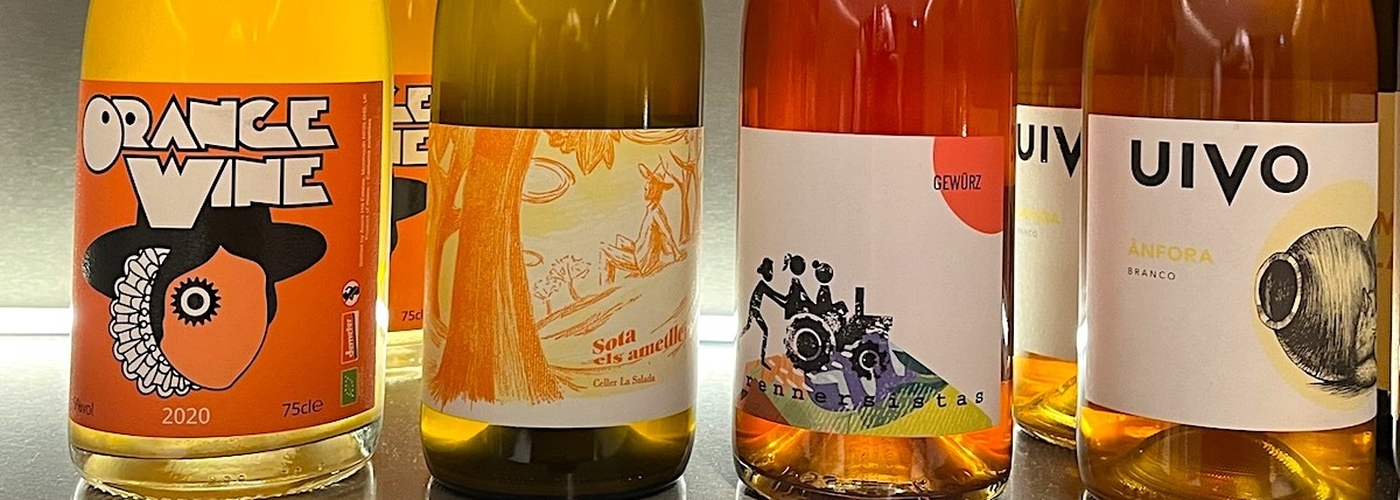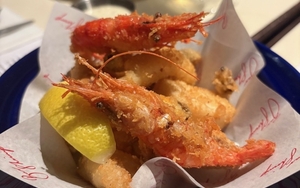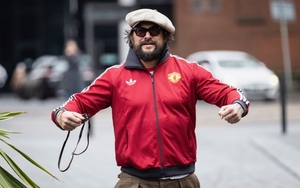Old lush, sorry, wine fanatic Neil Sowerby tours the natty wine sellers of MCR for some top tipsy tips
You can bet your last bung the bottles Tory apparatchiks were smuggling into Downing Street didn’t qualify as "natural wine". Supermarkets may have caught up on "craft beer" and are packing the chill counters with dubious plant-based convenience foods, but minimum intervention vino from small scale producers? Not on their radar.
Look elsewhere, though, and wine produced without the aid of herbicides and pesticides, with less manipulation in the fermentation process, is certainly no fleeting trend. Now accounting for an estimated one per cent of wine production worldwide, the natural stuff tallies with our yearning for artisanal purity and a return to traditional basics in the teeth of environmental degradation.
Whether it’s a tomato, a chicken leg or wine, the quality and taste we find in supermarkets is so far from what is grown with care and passion by independent farmers
This "rewilding" of wine doesn’t come cheap. The prices, necessarily higher, can be as dazzling as the labels, so a bottle purchase can feel like a fizzy/hazy risk too far, a step in the dark. Still, there’s lots of advice and chances to taste by the glass first. Proof that natural wine has infiltrated the Millennial/Gen Z Manchester mindset is the rapidly increasing availability.
Mainstream merchants such as Salut, Reserve, Ad Hoc, Grape To Grain and Blossom Street Social all stock a shelf or two. It dominates wine lists at Where The Light Gets In, The Creameries, 10 Tib Lane, Another Heart To Feed and Wolf at The Door. Check out too Idle Hands and Arlo’s in the Northern Quarter and out in Monton The Wandering Palate.
Yes, there is a bewildering amount of choice. So, to try and grasp the appeal, we put these five questions to nine frontline champions of Natural Wine and the answers were reliably refreshing…
A - Why and how did you get hooked on natural wine?
B - Has the battle been won with consumers or is it still perceived as a millennial niche choice?
C - Name me an entry-level wine on your list you’d particularly recommend.
D - And one at the high end?
E - Chuck in an unfamiliar, possibly challenging, wine you wish to convert customers to?
In part one, we speak to experts from Isca, Flawd, Erst and Le Social. Look out for part 2 which features Vin De Bodega, Wine Boy, Suppher, It's Alive and Kerb.
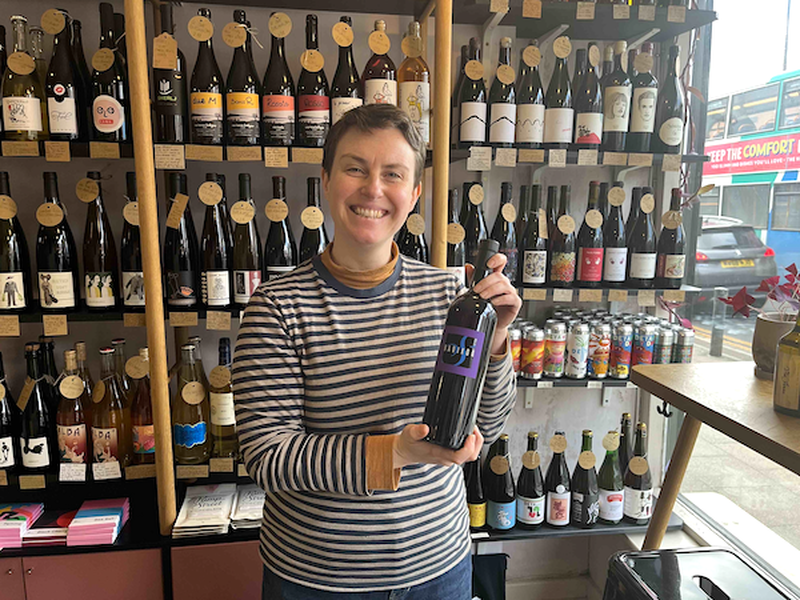
ISCA LEVENSHULME
Caroline Dubois created the appropriate natural wine list for the launch of Stockport’s groundbreaking restaurant, Where The Light Gets In. She remains a consultant there, after co-founding Isca, a casual wine and small plate cafe on Stockport Road.
A I remember well the first time I had natural wine. It was in Montreal where I used to live. It was a cloudy white wine and I couldn’t get my head and senses around it. I’d never tasted anything like it before and it was intriguing. What I could identify then was something alive and a form of energy that touched me. And I became obsessed.
Natural wine is about life. It’s about encouraging biodiversity and engaging with the very specificity of where we are (terroir). It is about caring for the soil, the grapes and for the life growing and existing on the vineyard. And it is about celebrating the labour that this care requires. It’s not a style, it’s a way of being. It’s not about getting a fixed product, but about giving life to something that will keep evolving.
B People are becoming more aware about climate change and industrial food and farming. People are understanding that what we ingest is important, for us individually (our health) and for the planet (our environment).
C Wilder Satz, 2020 (£20) from Bockenheim, Germany, is a blend of four white grape varieties to be drunk young because it’s full of energy. It’s like an electric juice and it looks like a cloudy lemonade. Fifth-generation winemaker Daniel Brand converted to organic a decade ago, to no sulphites three years later. Granny draws the labels and all their grapes are crushed by foot.
D Friuli in North-East Italy is orange wine country. Slatnik, 2019 (£37) from the Radikon winery is made from Chardonnay and Tocai white grapes. Stanko Radikon and his family use no chemical additives and minimal treatments. The wine is aged for three years in large wooden barrels and then for one more year in bottle. Because of the skin maceration similar to that for red wine, it is deeply and intensely coloured. Its richness and complexity will transport you.
E Vin Jaune from the Jura in Eastern France – absolutely. It is similar to dry fino Sherry and gets its character from being matured in a barrel under a film of yeast, known as the "voile", on the wine's surface. Because of this oxidative winemaking maturation, the resulting vins jaunes (yellow wines) are dry, nutty and spicy. *£12 corkage charge for drinking in.

FLAWD ANCOATS
Daniel Martin is the wine guru at this low intervention/sustainable small plates destination at Islington Marina. The laid-back American is no stranger to hip waterfront hang-outs, having worked at a certain noma in Copenhagen.
A Landing a job at Blue Hill at Stone Barns restaurant (in upstate New York) I was exposed to the passion farmers have for their produce and learnt how to translate that into a guest experience in the dining room. I began drinking natural wine in some bars in New York City and the intensity of flavour began to creep into my palate, but I wasn’t fully hooked until I started to work at restaurant noma. I began to understand it’s not just a preference but a lifestyle choice. Once I started visiting winemakers in their own vineyards, it all fully sunk in and there was no turning back. When you begin to understand the amount of work, dedication and love it takes to do what they do, it’s hard to not want to share their stories and wines.
B We don’t see it as a battle at all. We understand the general consumer awareness of natural wine in Manchester is not the same as some other cities, but Flawd isn’t based around trying to prove anything. We don’t give anyone a choice because we only pour wine that is made with as little to no additives as possible. The customer response has been very positive.
C Ramon Jané Baudili Blanc 2020 (£23). Ramon has vineyards just outside of Barcelona that have been in his family for generations. He makes vibrant, energetic and fresh wines from native Spanish varieties and this white is a blend of Xarel-lo and Parellada. It’s so versatile and fully absorbs the Mediterranean terroir; high acidity, sea salt, and sun in a glass.
D Domaine Matassa Cuvée Marguerite 2020 (£36). Based in Roussillon, SW France, Tom Lubbe is one of my favourite winemakers. 2020 was a disastrous year, but the grapes that survived gave some of the best wine I’ve tasted. Marguerite is made from Muscat a Petits Grains and has a beautiful golden colour. Floral, super aromatic and full of honey notes, it has the perfect balance between rich and fresh.
E Mauer Oszkár Kadarka 2020 (£25). Oszkár is based on Serbia’s border with Hungary. He cultivates about 15 ha of land by hand and horses, growing native grapes from the region. He is a fourth-generation winemaker and some of the vines are over 100 years old. This wine comes from very old vines and is a beautiful expression of the local Kadarka grape. A unique red, light in body, it bursts with berries and has a slight marzipan finish that rounds everything off. Challenging for some, but hard to beat sitting outside on a sunny day at the marina drinking a chilled glass. *£Drink-in mark-ups around a tenner.
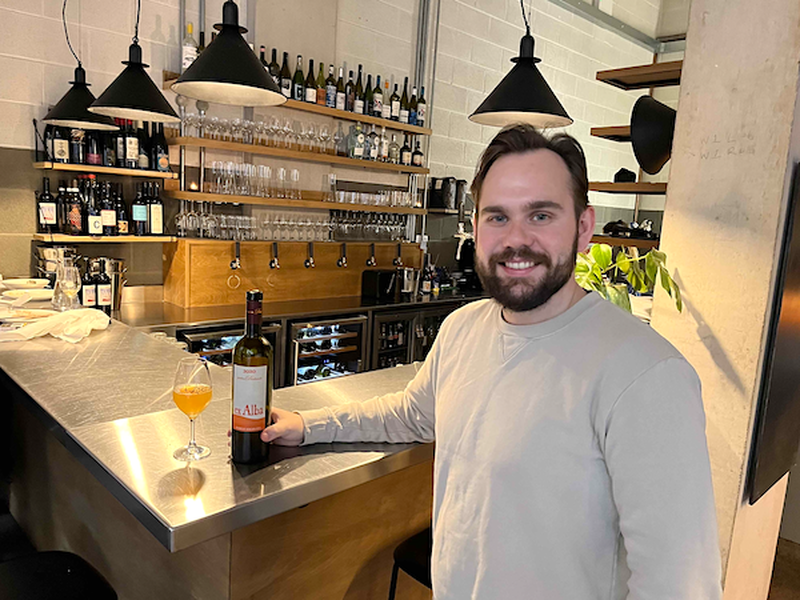
ERST ANCOATS
Will Sutton was once a barista for Trove, Levenshulme before co-founding this glorious small plates restaurant/bar, defined by its commitment to low intervention wine.
A Probably as I started visiting restaurants and bars that were serving wine produced in this way. You’ll be spoilt for choice in London, but one of the first experiences I had in the north of England was at Xiringuito when it came from Margate to Liverpool in 2016/2017. Opening Erst we wanted it to be somewhere you were able just to pop in for a glass and try a few wines by the glass, which was difficult to do at the time. There’s a great community of bars and restaurants in Manchester now, especially in Ancoats with Flawd and Kerb.
B There are lots of wines out there, low intervention/natural, that are completely classic in style, Davenport in Sussex being a great example of this. Also, as people have more concerns about aggressive farming and look at more sustainable options, it will naturally become the consumer choice over time.
C Nibiru Grunstien Rosé. A super exciting young partnership from Josef Schenter and Julia Nather. It’s £33 on our list, so a little more than all our £20 entry wines but with the extra bit of investment gives you a totally different experience. It feels alive. Lots of red berries and minerality.
D/E Vinyes Toruga – Doolittle (£65). One to convert people too as it is a direct press Barbera from Spain. Normally think of Barbera and it’s a dark, big red from Italy. Here it is produced the same way as a rosé, pouring really light. It still has the big energy you would expect from a Barbera and it just keeps going. We opened a bottle on Saturday night and I was still tasting it Sunday morning.
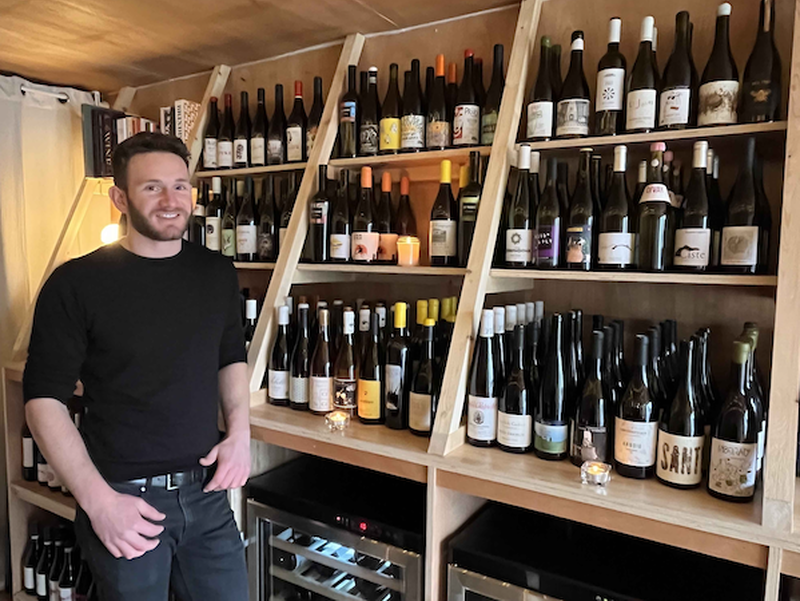
LE SOCIAL NEW ISLINGTON
Jérôme Boullier has just opened up his container wine store, in Pollard’s Yard near the Etihad Stadium, as a bijou bar each Saturday (2pm-8pm) after a high profile residency at Kampus and success as an online operation. The Nantes native has a background in the mainstream wine world with importers Morgenrot.
A Wine was always part of my upbringing in France. Many local small producers are just making the wine they enjoy drinking, working in a traditional fashion and more than often they avoid the use of pesticides and chemicals in the vineyard and cellar. I like to call these wines "natural and/or organic-by-default". It’s a taste I have found again when tasting natural wines in the UK and I find it difficult to drink anything mass-produced now.
When lockdown started I realised there wasn’t a convenient, reliable retailer of such wines in the city centre. I started to deliver wines to my friends in May 2020, on my bike, mostly via word of mouth. All the profits were going to charity. It grew from there, a community of people around wine. Hence the name. Pollard Yard became ours and we quickly started to work with other places such as the General Store group.
B The keyword here is choice. I don’t believe natural wine can be tagged as a generational trend. People are changing their consumption habits to introduce more and more sustainability. Natural wines represent a tastier, greener, more diverse and inclusive side of the wine and food industry. Slow but steady wins the race. Whether it’s a tomato, a chicken leg or wine, the quality and taste we find in supermarkets is so far from what is grown with care and passion by independent farmers. Of course, there will be pleasant wines in-store, and prices are very different too. But I believe less but better is the way forward.
C Diane Red (£11.50) Not technically natural, but a real gem at that price. Anne and Géraud Arbeau, brother and sister, are in charge of this family-owned domaine started in the 19th century. A great example of passionate producers who, like us, are on a conscious journey to make everything they do more sustainable and natural. Organic, stunning "everyday" red from the South West of France with comforting red and black fruits and spice. The white and rosé are equally good.
D It has to be Lumière, Muchada-Léclapart (£45). It’s an haute couture white, where Champagne meets Sherry: a totally unexpected collab between David Léclapart (Champagne) and Alejandro Muchada (Jerez). Made biodynamically with some of the best parcels of Palomino grapes, usually used for Fino, and very little is done in the cellar. Incredibly delicate and subtle, at its best with a very fresh, fine fish.
E Rosés are incredibly versatile and deserve a lot more love in winter. Georgia is a classic wine region so why not kill two birds with one stone by drinking Georgian rosé? Start with this awesome Revoir un Printemps, Ori Marani (£21.60)? The producer is originally French but has fully adopted the native grapes and techniques. This is fruit-forward with melon, pomegranate, apricot, a touch of pepper and spices and a herbal lift. *£5 corkage charge for drinking in.
Follow Neil Sowerby on Twitter @antonegomanc
Read next: What is natural wine - learn from Manchester's wine buffs
Read again: Changing the face of wine – Meet Manchester’s female sommeliers (Part 4)
Get the latest news to your inbox
Get the latest food & drink news and exclusive offers by email by signing up to our mailing list. This is one of the ways that Confidentials remains free to our readers and by signing up you help support our high quality, impartial and knowledgable writers. Thank you!






